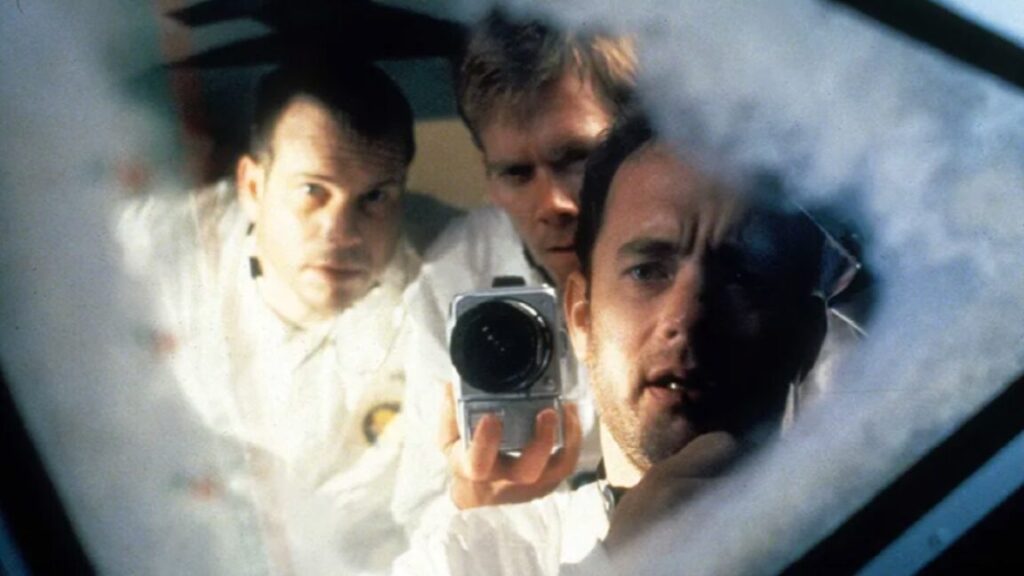
This year marks the 30th anniversary of the 1995 Oscar-winning film Apollo 13, director Ron Howard’s masterful love letter to NASA’s Apollo program and the eponymous space mission. As we revisit this riveting homage to American science, ingenuity, and daring, the film’s enduring impact on popular culture and its reflection of a pivotal moment in space exploration deserve renewed attention.
Apollo 13 is a fictional retelling of the aborted 1970 lunar mission that became a “successful failure” for NASA. Against steep odds, all three astronauts returned to Earth alive. The film opens with astronaut Jim Lovell, portrayed by Tom Hanks, hosting a watch party in July 1969 for Neil Armstrong’s historic first walk on the Moon. Lovell, initially slated to command the Apollo 14 mission, is ecstatic when he and his crew are bumped to Apollo 13. His wife, Marilyn, played by Kathleen Quinlan, is less thrilled, noting the superstition surrounding the number 13.
A Mission Turned Crisis
A few days before launch, Ken Mattingly, played by Gary Sinise, is grounded due to potential exposure to measles and is replaced by backup astronaut Jack Swigert, portrayed by Kevin Bacon. Despite this setback, the launch proceeds smoothly, but the mission soon takes a dramatic turn. During a routine maintenance task, an electrical short causes an oxygen tank to explode, leaving the crew with less than an hour to evacuate the command module Odyssey into the lunar module Aquarius, which they use as a lifeboat.
The new mission objective becomes clear: keep the astronauts alive long enough to figure out how to bring them safely home. This involves overcoming numerous challenges, including interpersonal tensions, freezing conditions, dwindling rations, and rising CO2 levels. The crew’s ingenuity and teamwork are put to the test as they execute a manual course correction without a navigational computer, a scene that remains one of the film’s most gripping moments.
The Real “Successful Failure”
The real Apollo 13 mission, launched on April 11, 1970, was intended to be NASA’s third moon landing. However, the explosion of an oxygen tank crippled the spacecraft, forcing the mission to be aborted. The crew, consisting of Jim Lovell, Fred Haise, and Jack Swigert, faced life-threatening conditions as they worked with mission control to devise a plan to return safely to Earth.
“Houston, we’ve had a problem,” Swigert famously reported, a line that has since become synonymous with the mission’s crisis.
NASA’s response to the emergency was a testament to the agency’s problem-solving capabilities and the resilience of the human spirit. The mission’s challenges were numerous, from navigating the spacecraft using the Earth’s terminator line to conserving power and water. The successful return of the crew on April 17, 1970, was celebrated worldwide and remains a defining moment in space exploration history.
Legacy of the Film and Mission
Apollo 13 the film not only brought the story of this mission to a new generation but also highlighted the human elements of the crisis. The film’s success is attributed to its attention to detail and the authenticity of its portrayal of the astronauts’ experiences. Director Ron Howard’s commitment to realism included consulting with NASA and involving former astronauts in the production process.
The film’s release in 1995, a quarter-century after the actual mission, reignited public interest in space exploration and underscored the importance of perseverance and teamwork in overcoming seemingly insurmountable obstacles. The film’s tagline, “Houston, we have a problem,” became a cultural touchstone, reflecting the broader challenges and triumphs of human exploration.
Looking Forward
The 30th anniversary of Apollo 13 serves as a reminder of the enduring spirit of exploration and the importance of storytelling in preserving history. As NASA and other space agencies continue to push the boundaries of what is possible, the lessons learned from Apollo 13 remain relevant. The mission’s legacy is a testament to the power of human ingenuity and the unyielding drive to explore the unknown.
As we celebrate this cinematic and historical milestone, it is clear that the story of Apollo 13 will continue to inspire future generations to reach for the stars, reminding us that even in the face of adversity, success can be found.







